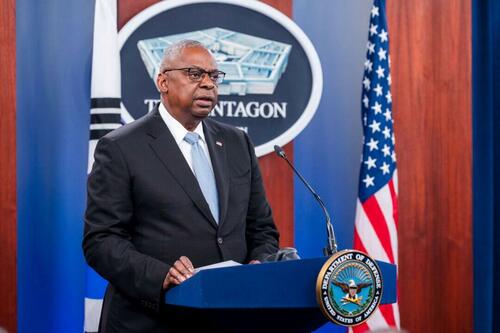Authored by Tom Ozimek via The Epoch Times,
For the seventh year in a row, the Department of Defense (DOD) has failed its annual financial statement audit, a massive undertaking meant to ensure accountability for its $3.8 trillion in assets and $4 trillion in liabilities.
Despite the setback, Pentagon officials highlighted incremental progress and reaffirmed their commitment to securing a clean audit opinion by 2028.
The latest results, released on Nov. 15, confirmed that the DOD, once again received a disclaimer of opinion, meaning auditors could not provide assurance over the completeness and accuracy of the Pentagon’s financial records.
This year’s audit, like the six before it, exposed persistent challenges in the DOD’s financial management systems.
Teams of auditors conducted hundreds of site visits, assessing how the DOD manages taxpayer dollars across its operations, which span more than 4,000 sites in more than 160 countries.
Of the 28 sub-audits conducted across Pentagon entities that undergo standalone financial statement audits, only nine received unmodified (clean) opinions. Another entity received a qualified opinion, while 15 entities were issued disclaimers. Three audit opinions remain pending.
Secretary of Defense Lloyd Austin said that, while some progress was made in this year’s annual audit, challenges remain.
“There are several areas where we need to work harder and achieve better results,” Austin said in a statement.
Critical improvements are needed in areas such as improving efficiency and property valuation, increasing accountability, capturing all accounting system transactions, and modernizing the Pentagon’s financial systems, he said.
The audit report revealed that the Pentagon reported a Fund Balance with Treasury (FBWT) of $855.5 billion but failed to perform accurate and timely reconciliations, increasing the risk of material misstatements.
Key issues noted in the report include unresolved variances and inadequate internal controls in reconciliation processes.
The Pentagon also reported $452.1 billion in General Equipment and Internal Use Software but failed to provide adequate documentation or controls to support its valuation, raising the risk of inaccuracies in its financial statements.
To address these shortcomings, auditors recommended enhanced monitoring, timely variance resolution, and implementing standardized processes to ensure compliance with accounting standards.
Austin said although “significant strides” have been made this year, more work needs to be done. He expressed confidence that the Pentagon will achieve a passing grade in 2028.
“We are determined to reach this milestone. I have zero tolerance for fraud, waste, and abuse—in the Pentagon or elsewhere in the Department,” he said.
Despite failing to pass the annual audit, the Pentagon has made progress in resolving key material weaknesses identified in prior audits, according to Mike McCord, the DOD’s chief financial officer. McCord singled out the U.S. Marine Corps’ unmodified audit opinion—a first for the branch—as a model of success driven by high-level leadership and sustained effort.
“We expect this same commitment from the leaders of the other Military Services,” McCord said in a statement.
The Pentagon also closed its DOD-wide Contingent Legal Liabilities material weakness and made progress in other critical areas, with 19 material weaknesses closed or downgraded in 2024, including improvements in Fund Balance with Treasury reporting, according to McCord.
To meet the 2028 deadline for an unmodified opinion, McCord said the Pentagon will focus on addressing the root causes of its most significant material weaknesses.
He emphasized the importance of training initiatives across the Pentagon’s financial management workforce to close essential skills gaps, while leveraging advanced technologies, such as machine learning and robotic process automation, to increase data reliability and streamline financial processes.
